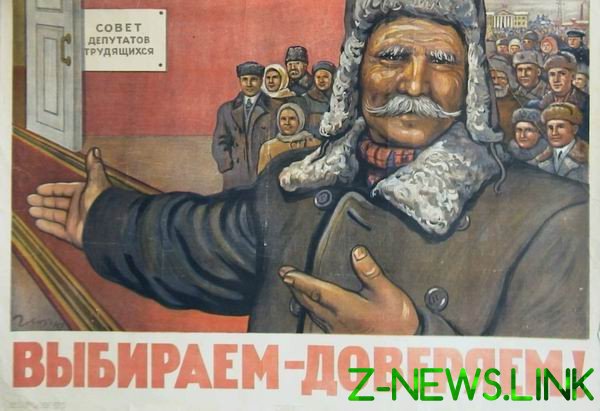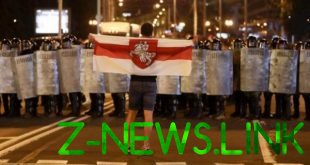
Now in Moscow and St. Petersburg removed from the elections of almost all opposition candidates. Cut them as with the help of the municipal filter, and through culling of the cast for their signatures. For example, on the signature sheets to the number of the passport dorisovyvali extra digit to the passport data has become invalid. The data of the signatories deliberately entered into Internet search engines with the distortion in the spelling of the surname, the name, home address, etc., which guaranteed a negative result: the search engines showed that of the person with such data does not exist. Well, quite so to be safe, reliable experts-handwriting experts have concluded that hundreds of signatures for opposition candidates is made by the same hand, and therefore invalid.
In Soviet times elections at all levels was also subject to fraud and manipulation. Let’s see how it happened.
In the 1920-ies in the elections to the Soviets of different levels, according to the USSR Constitution of 1924, the rate of representation for citizens was set to 1 Deputy per 25,000 inhabitants, and rural area — 1 Deputy for every 150,000 inhabitants. In addition, since 1918 in the RSFSR and other Soviet republics, there was a category of “disenfranchised”, that is, persons deprived of voting rights. She was treated: persons resorting to hired labour for profit; persons living on unearned income; private merchants, trade and commercial intermediaries; employees and agents of the former police, the special corps of gendarmes and security departments, as well as members of reign in Russia at home and, finally, the mentally ill and convicted. “Sometimes the increase in the number of the “disenfranchised” was excessive,” said the GPU in the “Overview of the political condition of the Soviet Union in January 1927”. In some areas, in particular in a number of volosts of Arkhangelsk province, the proportion of citizens deprived of suffrage was achieved due to the “kulaks” of 50%.
<hr/>
No real power, the Soviets did not possess. However, sometimes you have to “neutralize” certain dangerous persons, not recognized over a party’s control
<hr/>
But with the elections to the councils in terms of the one-party system and the inevitability and openness of vote special problems did not arise, especially after the Civil war, no real power, the Soviets did not possess. However, sometimes you have to “neutralize” certain dangerous persons, not recognized over a party’s control. The writer and human rights activist Lev Kopelev recalled how in the early 30-ies, when he was a Komsomol activist in the Kharkiv locomotive plant them. Of the Comintern, he and other members of the Komsomol received from the local security officer Alexandrov job to fail in the elections to the city Council “the most dangerous factory man Fyodor Terentyev” — the foreman fitter, who enjoyed great authority among the workers: “Fyodor was called “international man”. Was told that in 1924 or 1925, the year he, as a delegate of all-Union Congress of Soviets, gave this speech that the foreign Newspapers wrote about her as “the spontaneous working of the opposition”, and Kalinin, called him a demagogue. Since then, he would not reach neither the Union nor at national congresses, but in the Kharkiv city Council it is invariably chosen. Voted openly. And it raised a lot of hands. Voted and those who used to argue with him. “Let it ever got sorted out, but the truth hurts, not looking… Better than those who keeping mum, words can not say, or cunning, watch out — “my business”…”
“The hot shot”, according to Kopelev, neutralized in the following way: “We learn some of the most experienced activists correspondents to offer his candidacy in obsesivos election Commission. On the shop floor Assembly voted for it all, and the Commission was elected Vice-Chairman. But when they began to nominate candidates to the city Council and he was called among the first, in the original paper appeared in the skit “the Man himself chooses” and the cartoon — mustached, big-nosed Fyodor tightens itself on the block with the words “Electoral Commission” to the tower “city Council”. To leave the Commission, he was later on elected assemblies, he was given a reasonable “legitimate” withdrawal… So in 1931, for the first time since 1920, Fyodor ceased to be a member of the city Council”.
Another thing — party bodies, in whose hands was concentrated the real power. Here the conditions of existence of the various factions until 1927 retains some remnants of democracy, although the party apparatus had always managed to ensure a solid majority for the Stalinists. Former Secretary of the Politburo, Boris Bazhanov recalled, as was the case with the election of leading party organs at the XIII party Congress in may 1924: “the Congress is the election of Central party organs (Central Committee, Central control Commission, Central revision Commission). Before that bring together the leaders of the Central Committee with the heads of the main delegations (Moscow, Leningrad, Ukraine, etc.). This so-called “Senioren-Convention” called in common parlance as “blue envelope”. It produces in the debate a draft composition of the new Central Committee. This list is printed and each delegate with the right to vote receives one copy of the list. This instance is by ballots, which will be omitted in the ballot box at the election of the Central Committee, produced by secret ballot. But the fact that there is only one list, does not mean that the delegates are obliged to vote for him.
Here the party, not the Council elections. In party’s a party of freedom, and each delegate has the right to delete from the list any name and replace it with any other of your choice (which we note by the way, he must write with his own hand). Then counts the votes. Very little chance to hold the “blue envelope” was unselected; it requires an unlikely conspiracy of important delegations (capital and others). But although the whole list is usually held, the number of votes cast for selected varies widely.
If, say, 1000 delegates, the most popular in the party people will be 950-970 votes, and the least acceptable and will not collect 700. It is very noticed and taken into account. What exactly is not taken into account and that no one knows is the work of Tovstuha <assistant of Stalin. — B. S.>. Most interested in Tovstukha (i.e. Stalin) who of the delegates on their ballots crossed out the name of Stalin. If he only struck out, his name would still be covered by anonymity. But, removing that he had to write another name, and it gives information about his handwriting. Comparing the handwriting with the handwriting of the delegates in their questionnaires, filled out by hand, Tovstukha and KGB graphologist establish who voted against Stalin (and, therefore, it is a hidden enemy), and who voted against Zinoviev, and Trotsky who is against and who is against Bukharin. This is all for Stalin is important and will be taken into account. And especially — who is the hidden enemy of Stalin.”
The list “Senioren-Convention” — is essentially an analogue of the informal “Luzhkov’s list”, which is communicated to the electoral commissions there to know who the then-mayor of Moscow would like to see part of the Moscow city Duma. Probably now exists and operates is similar to the “list of Sobyanin”. If to return to the Soviet practice, it is likely that someone from the coordinated candidates will not be elected to the Central Committee, almost was not, because the opposition have always been in the minority and could only be expunged by Stalin and his closest associates, lowering their rating, but not preventing election. And such a vote was not secret because the handwriting was established, who struck out.
The USSR Constitution of 1936 abolished the category of “disenfranchised” and proclaimed the universal direct, equal and secret ballot, although the new Supreme Council on the matter was as powerless as the former Central Executive Committee and the CEC.

Formally, the election does not exclude the nomination of several candidates for one seat. But in fact, the vote remained uncontested. And the elections to the Supreme Soviet of the USSR in December 1937 was preceded by a massive campaign of repression that people are not too was wondering why the ballots left only one candidate. At the February-March Plenum of the Central Committee of the CPSU(b) in 1937, which launched mass terror and the preparations for the elections, the question of the head of Kazakhstan’s Communist party Levon Mirzoyan “From the district may be a candidate or will be admitted placing 2-3?” the head of the Department of party propaganda and agitation of the Central Committee Alexander Stetsky recalled that one of the former leaders of the Trotskyist opposition, Karl Radek, had already arrested, on Constitutional Commission “made a suggestion that was allowed to put any citizen or group of citizens of their candidacy to the Council. Obviously, there was far to count on to spend some of their own, their funds, etc. Undoubtedly, the shards, the remnants of the Trotskyist organization and the right is still there”.
Under the Constitution, candidates could nominate only public organizations and societies of workers (labor groups), that is, only those organizations that “as organizations of public initiative of the working masses of the cities and villages, aim at active participation in the socialist construction of the USSR, as well as the promotion of the defence of the country.” It’s kind of similar to the current municipal filter.
The sample ballots published in Newspapers, showed more than one candidate per seat. In the elections to the Supreme Council were allowed to nominate several candidates. In reality, however, each electoral district nominated only one candidate, and the whole process was under strict control of the regional committees and territorial committees of the party. Any changes in the list of candidates were approved at the meetings of the Bureau of the CPSU(b). Help to put forward in deputies of the Supreme Soviet of the USSR (as well as the chairmen of district election commissions) was signed by the head of the local NKVD. Initially it was possible to nominate more than one candidate, but these additional candidates were taken only from deflated from Moscow list of 32 leaders of all-Union scale, including all members of the Politburo headed by Stalin, which it was possible to nominate any district. The total number of extensions is strictly ranked depending on the place in the party-state hierarchy: the first was Stalin, followed by Molotov, etc. But in the end still in each County recorded only one candidate .
In a well-regulated election machinery sometimes happened unnecessary initiative on the ground. Thus, on 14 February 1947 the head of the MGB, Viktor Abakumov reported to Stalin:

“According to the Ministry of state security of the Ukrainian SSR in the period of preparation for the elections to the Supreme Soviet of the USSR from the Secretary of the Stalin district Committee of CP(b)of the city of Zaporozhye MIKHAILENKO were perversions of the Stalin Constitution.
MIKHAILENKO appointed in each election Commission of the Stalin electoral district commissioners district Committee of CP(b)U, which suggested to the Chairman of District election Commission ballot papers in the amount of 10% of the total number of voters and the counting of results of voting to replace the ballot papers of voters who voted against.
The chairmen of the precinct election commissions of the Stalin electoral district was instructed not to put in the cockpit pencils or leave them neozhidannymi, to create an environment in which voters after receiving the ballots would be deprived of the opportunity to go into the cabin and directly went to the polls.
To carry out their instructions MIKHAILENKO has attracted employees of the Stalin district Committee of CP(b)U and a significant part of the party activists.
The comments of a number of Communists that such actions are a violation of the provisions on the election of the staff Committee argued that such “installation” they give on behalf of the Central Committee of CP(b)U and Zaporizhia regional Committee of the CP(b)U.
Doing these “settings”, Secretary of the party Committee of plant No. 478 CANDIA February 4 called Communists trusted the polls, and said instructions received from MIKHAILENKO, said that the chairmen of precinct electoral commissions will have to achieve in order to deprive voters of the opportunity to strike the candidate on the ballot, which must accompany the voter directly to the ballot box, bypassing the cab.
At the same meeting, the CANDIA said: “be aware that you installation is not allowed. Did not give you such facility and factory party Committee. The one who gets caught, he will pay party ticket is the installation from above.”
The same setup CANDIA gave February 3 at the meeting of Chairpersons of precinct election commissions at plant No. 478.
February 1 in the Stalinist RK KP(b)U was caused by the Secretary of the party Bureau of the office of the MGB in the Zaporozhye region, major GROCHOW that head. Department orginstruktorskogo Department of the Communist CHEREPANOV has announced that he is attached to the 27 polling station.
Then CHEREPANOV, in the presence of the assistant Secretary RK KP(b)U SVATIKOVA, instructors STACHEK and EFIMOVA said GRAHOVO that the Chairman of the electoral Commission will be given extra ballots for the substitution of invalid ballots, and those which will be removed the names of the candidates.
As stated CHEREPANOV, substitution of ballots GROCHOW should produce, together with the Chairman of the precinct election Commission during vote count.
The question GROHOVA about someone coming from such installation, CHEREPANOV referred to the instructions of the Secretary of Zaporizhia regional Committee of the CP(b)U tov. Brezhnev.
On these facts it was reported to the Secretary of the regional Committee of CP(b)U tov. BREZHNEV, who was suspended MIKHAILENKO from the leadership of the preparations for the elections.
About the presentation informed the Central Committee of the CP(Bolshevik)of Ukraine”.
<hr/>
In the Stalinist countryside was a candidate to the Supreme Council of Ukraine himself, Leonid Brezhnev. Sycophants decided to hurry up and do so against the first Secretary of the regional Committee was not given any voice
<hr/>
It was that Stalinist countryside was a candidate to the Supreme Council of Ukraine himself, Leonid Brezhnev. Sycophants decided to hurry up and do so against the first Secretary of the regional Committee was not given any voice and to see this in provincial and national election commissions. However, the sycophants overdone. Methods of rigging they used, with the substitution of ballots and neozhidannymi pencils in polling booths, got too much publicity among party activists. Apparently, established by the time the practice of fraud was different. The electoral Commission, reflected in the protocols is not a real vote, and a predetermined minimum votes against, and with a given turnout. So, on elections to the Supreme Soviet of the USSR in 1937 to vote against candidates “indestructible bloc of Communists and non-party” was allowed 0.7% of the number of voters. Similarly asked and turnout (at the election of 37-year — 96,3%). Mikhailenko reserved to substitute 10% of the total number of ballots. This would be enough to substitute 11% of the remaining ballots. So, it is expected that the number of spoiled ballots and ballots cast “against” will not exceed 11%. But this adulteration found out too many people. It is likely that Brezhnev was not aware of the initiative of his zealous subordinate. Anyway, no data on punishment Mikhailenko not.
Until now, no published data on how actually the Soviet people vote in the elections to the Supreme Soviet of the USSR, and in the councils of the lower levels. Probably, data on the actual turnout and actual number of votes “against” were not recorded, because no one was interested. Leak this kind of information could cause an international incident, so they likely were not collected. The only thing that is recorded is written on the ballot anti-Soviet slogans, and a variety of curses to leaders and candidates. The perpetrators of these outrages the authorities were trying to identify the handwriting, just like the assistant of Stalin’s handwriting was trying to determine which of the delegates crossed out the name of the Secretary General to vote on the composition of the Central Committee.
But the episode of Soviet history, later period. In February 1979, a few dozen Soviet human rights activists created the group “Polls-79”, which declared its intention to nominate its own candidates in the elections to the Supreme Soviet of the USSR, scheduled for March 4. Candidates were two: historian Roy Medvedev and engineer Lyudmila Agapova. But the group was denied registration as a public organization and, therefore, failed to achieve any of their candidates on the ballot.
Experience election fraud, the Soviet Union if need widely shared with the “people’s democracies” in Eastern Europe in the first years of their existence, when local Communists in this case is not ponatoreli, and the population is still not used to competitive elections. According to the testimony of a prominent figure of the Soviet KGB, Ivan Serov, who was also adviser to the Ministry of public security of Poland, “we helped Baruto to win the elections in Poland and was sent to the chief of Department “D” of the MGB Palkin for technical assistance of the Polish election campaign”. Indeed, on 30 June 1946 in Poland conducted a nationwide referendum on confidence in the Communist government. On the eve of the referendum in Warsaw were sent to 16 staff members of the division “D” of the MGB (production of means of cryptography, forgery), headed by the chief of Department of Colonel Aron Palkin. On June 22 the meeting Palkin with the Polish Communist leader Bierut was approved a plan of action for falsification of voting protocols. Palkin and his men did a truly Titanic work, re-crafting 5994 Protocol and forged with about 40 thousand signatures of members of precinct election commissions. As a result, the Communists have gained about 60% of the vote, although in reality, in any province, they did not score more than 15%, while the Peasant party, Stanislaw Mikolajczyk, according to Palkin, supported by 75% of voters. The Commissioner-General for the referendum in Poland, said: “In connection with threat of an attack of saboteurs, it was ordered, that where inadequate security of the polling station Commission immediately after the vote went to the ballot boxes to places where the security of the vote count was fully secured.” There is something just worked with Soviet experts to forge signatures.
As worked Palkin and his team during the elections to the Sejm in January 1947, providing the Communists (Polish workers party, PPR) for 80.1% of the vote, while their rival Peasant party — received only 10% of the vote, although in reality it supported the majority of the population. As he wrote in the report Palkin, in his advice people the Charge was carried out by “the substitution of ballot boxes in some polling stations, throwing in an urn bulletins and manufacturer in a number of commissions, which were not nominees of the party of Mikolajczyk <such commissions was more than 52% of the total. — B. S.>, the two copies of protocols, and one of the protocols did not have numbers. Protocol no figures were subject to further processing by the Troika of PPR with the aim of obtaining the necessary figures.” Because in election commissions representatives of PPR was 63,3%, and in the district — 39% and also the Polish security services have recruited more than 47% of members of district and more than 43% members of the district commissions (mostly those who did not belong to PDP), all went like clockwork. This time to forge a signature is not required. For his work on election fraud Palkin received the order of the red banner, which, however, did not save him from arrest and 5-year sentence on charges of “Zionist conspiracy in the MGB”.
© 2019, paradox. All rights reserved.





